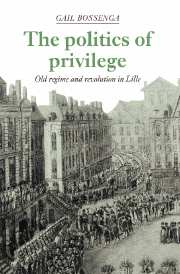Book contents
- Frontmatter
- Contents
- List of figure and tables
- Preface
- List of abbreviations
- 1 Monarchy, privilege and revolution: the problem and setting
- 2 State finance and local privileges
- 3 Corps, bureaucracy and citizenship: the case of the Bureaux des Finances
- 4 The excluded nobility and political representation
- 5 A nation of equals: the demands of the Third Estate
- 6 Uses of a regulated economy: the state against itself
- 7 Corporate privilege and the bourgeoisie
- 8 The abolition of the guilds
- 9 The corporate heritage and the well-ordered state
- 10 Conclusion
- Notes
- Bibliography
- Index
2 - State finance and local privileges
Published online by Cambridge University Press: 01 October 2009
- Frontmatter
- Contents
- List of figure and tables
- Preface
- List of abbreviations
- 1 Monarchy, privilege and revolution: the problem and setting
- 2 State finance and local privileges
- 3 Corps, bureaucracy and citizenship: the case of the Bureaux des Finances
- 4 The excluded nobility and political representation
- 5 A nation of equals: the demands of the Third Estate
- 6 Uses of a regulated economy: the state against itself
- 7 Corporate privilege and the bourgeoisie
- 8 The abolition of the guilds
- 9 The corporate heritage and the well-ordered state
- 10 Conclusion
- Notes
- Bibliography
- Index
Summary
The financial bases of government mirror the priorities and structure of the state itself. Forms of power, systems of social classification, notions of property, and flows of capital are all bound up in a state's fiscal apparatus. In the eighteenth century, the crown's financial problems called into question the political and social foundations of the monarchy. In Flanders, members of the provincial elite, noble and non-noble, challenged a system of royal domination resting upon a bureaucratic network of intendants and a corporately based alliance between the crown and provincial estates. The next four chapters explore contradictions underlying the crown's fiscal and administrative policies and their effects on provincial politics. Reinforcing, and even creating, dispersed corporate privileges at the same time as it fostered egalitarian ideals, the extension of monarchical power ultimately reached an impasse that helped to open the way to a radical reconstruction of the basis of state authority.
Provincial power: crown, municipal magistrates and noble baillis
The estates of Walloon Flanders, as we noted earlier, were controlled by delegates from Lille's municipal magistracy and four noble baillis appointed by the principal seigneurs hauts justiciers in the countryside. Lille's municipal magistracy was composed of thirty-three temporary officials and ten permanent ones who assisted them. Like other cities in Walloon Flanders, Lille had never had a tradition of municipal elections. Every year, according to the regulations set by the city's medieval charter of 1235, four royal commissioners selected the temporary members of the corps and audited the city's accounts. Under French rule these commissioners were the governor of the province, the intendant, and two noblemen appointed by the king.
- Type
- Chapter
- Information
- The Politics of PrivilegeOld Regime and Revolution in Lille, pp. 22 - 46Publisher: Cambridge University PressPrint publication year: 1991
- 2
- Cited by



